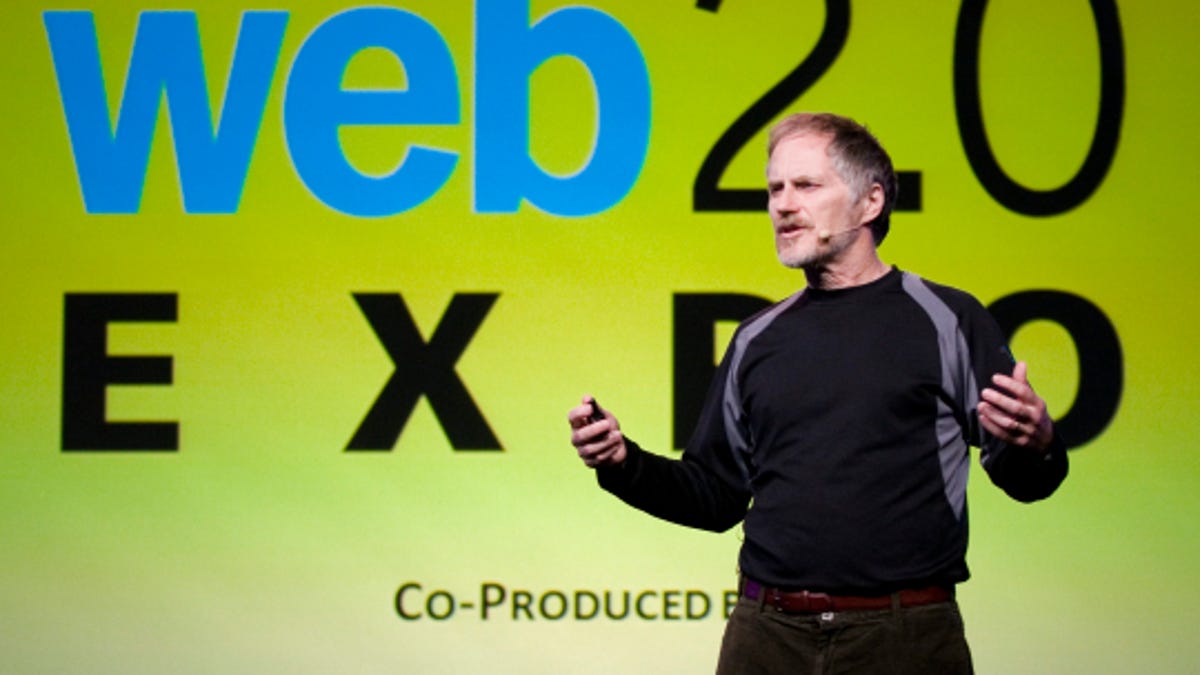O'Reilly: The Web is still learning, but it can teach, too
The kickoff keynote for this year's Web 2.0 Expo wasn't too surprising: that the world has a ton of problems and that the tech industry has a lot to offer.

SAN FRANCISCO--The floor of the exposition hall at this year's Web 2.0 Expo has been a little bit lethargic, to say the least. "It's a lot emptier than last year," said one representative from a social gaming company that had set up a booth. "I think the 'Web 2.0' thing has become a bit of a stigma."
Indeed, these days the term goes hand-in-hand with broken business models and overblown expectations, as much as it does with innovation. With the economy in shambles, attendance at the semiannual conference is down. The show floor is sparser and the speaker lineup less impressive than in years past, and attendees have had to hunt a little harder to find parties after hours.
But conference czar Tim O'Reilly, founder of O'Reilly Media (which co-organized the conference along with TechWeb), said that "Web 2.0" is more relevant than ever.
"Web 2.0 was never intended to be a version number," O'Reilly said in his keynote address on Wednesday afternoon. "It was really a reflection of what happened after the dot-com bust."
Now, he said, the Web is maturing and getting smarter. "The baby that we built with technology is growing up and starting to go to work," he said, mentioning examples like energy metering aggregator AMEE, the Google search application that predicted where the flu would hit next, and iPhone apps that derive search results from voice recognition.
At last spring's Web 2.0 Expo, the market crash was still months off, but the early signs were starting to creep in: venture funding was harder to come by, company launches were growing less frequent, and it was starting to become evident that some of the most-buzzed names in Silicon Valley hadn't produced solid business models yet. Then, O'Reilly's address exhorted the audience to push beyond the Web's trendiest hype machines and start thinking about how to change the world. But now that the rest of the world is searching for answers, he explained, it's time to put that thought to work.
"We thought because of the downturn, because all of us are faced with the idea that maybe those ideas of perpetual increase were going to be a problem, that we might have to do more with less," O'Reilly said. "Maybe there's actually power in less, and that's one of the lessons of the Web...In technology we have this wonderful power of less where we get more for the same amount, and I think we need to start thinking about how we apply Moore's Law to the world's problems."
This year, the power of technological innovation to reach far beyond the Web has already been justified in the election of Barack Obama, which used consumer-grade Web technologies like Facebook, Twitter, and YouTube as powerful communication and organization tools: "The way that he used technology to transform politics, the way that he harnessed his audience to do something that was profoundly world-shaping," O'Reilly said on Wednesday. "History's on a different course because of somebody understanding how to apply technology more effectively in a new realm."
The most important part, he concluded, is that it's crucial to keep up that Silicon Valley attitude of positive change for the greater good as it brings its business principles to the rest of the world. Getting too self-serving was what ultimately caused the market collapse this fall, he said. The tech industry has its egos, too, and that's what got us all into trouble the last time around.
"There were a whole lot of people (in the finance industry) who said, 'Wow, I can get a lot for myself here, and the financial system is really a tale of how collective intelligence can go awry. Because, of course, our financial system is also networked collective intelligence and yet it was somehow hijacked by the spammers, the Ponzi schemers, and the people who thought, 'I want to get something for me.'"
"We know what happened," O'Reilly said, showing a slide of the now-famous Twitter outage graphic of a flock of birds attempting to lift a whale above water. "That's the fail whale."

